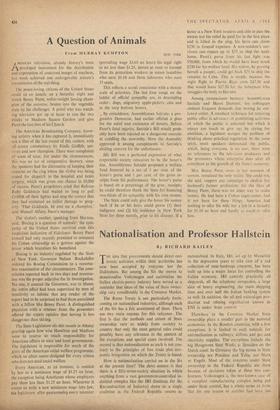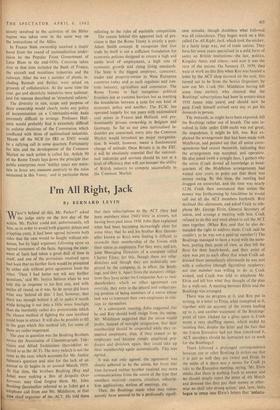Nationalisation and Professor Hallstein
By RICHARD BAILEY
THE idea that governments should direct eco- nomic activities within their territories has now been accepted by everyone but the Dukhobors. But among the Six the moves to denationalise Volkswagen and nationalise the Italian electric-power industry have served as a reminder that ideas of the value of State owner- ship vary considerably in the Common Market.
The Rome Treaty is not particularly forth- coming on nationalised industries, although each of the Six has a fair assortment of them. There are two main reasons for this reticence. The first is that the methods and extent of State ownership vary so widely from country to country that only the most general rules could possibly have any relevance in the context of the exceptions and special cases involved. The second is that nationalisation as such is not con- trary to the principles of free trade plus eco- nomic integration on which the Treaty is based.
How is nationalisation carried on in the Six at the present time? The short answer is that there is a fifty-seven-variety situation in which anything from a vast government-controlled in- dustrial complex like the IRI (Institute for the Reconstruction of Industry) down to a single coalmine in the Federal Republic counts as
nationalised. In Italy, IRI. .set up by Mussolini in the depression years to take care of a sad collection of near-bankrupt concerns, has been built up into a major force for controlling the Italian economy. 1RI controls practically all shipyards, all the telephone companies, a large slice of heavy engineering, the main shipping lines and over half the Italian banking system as well. In addition, the oil and natural-gas pro- duction and refining organisation known as EN I is under State control.
Elsewhere in the Common Market State ownership plays a smaller part in the national economies. In the Benelux countries, with a few exceptions, it is limited to such naturals for nationalisation as railways, airlines and gas and electricity supplies. The exceptions include the big Hoogovens Steel Works at Ijmuiden on the Dutch coast. In Germany the big names in State ownership are Potsdam and Yalta, not Ma IA or Engels. Most of the concerns under State ownership in the Federal Republic are there because of decisions taken at these two con- ferences. Volkswagen is the best-known case of a complete manufacturing complex being put under State control, but a whole series of firms that for one reason or another had been too closely involved in the activities of the Hitler regime was taken over in the same way on the instructions of the Allies.
In France State ownership received a major boost from the round of nationalisation under- taken by the Popular Front Government of Lon Blum in the mid-1930s. Concerns taken over at that time included the Bank of France, the aircraft and munitions industries and the railways. After the war a number of plants, in- cluding Renault and Berlict, were seized on grounds of collaboration. At the same time the coal, gas and electricity industries were national- ised for reasons described as 'structural reform.'
The diversity in size, scope and purpose of State ownership would clearly make any policy of harmonisation on a Community-wide basis extremely difficult to arrange. Professor Hall- stein would probably find it extremely difficult to enforce decisions of the Commission which conflicted with those of nationalised industries. `Hands off the NCB (or IRI or ENI)' would be a rallying call in some quarters. Fortunately for him and the development of the Common Market no such action is called for. Article 90 of the Rome Treaty lays down the principle that public enterprises must 'neither enact nor main- tain in force any measure contrary to the rules contained in this Treaty,' and in particular those referring to the rules of equitable competition.
The reason behind this apparent lack of pre- cision is that the. Rome Treaty is strictly a post- Adam Smith concept. It recognises that free trade by itself is not a sufficient foundation for economic policies designed to ensure a high and stable level of employment, a high rate of economic growth and rising living standards. The State is the biggest employer, consumer, trader and property-owner in West European countries today and as such regulates and con- trols industry, agriculture and commerce. The Rome Treaty in fact recognises political frontiers not as customs barriers but as marking the boundaries between a taste for one kind of economic policy and another. The ECSC has operated happily for ten years with nationalised coal mines in France and Holland, and pre- dominantly private ownership in Belgium and Germany. So far as our own nationalised in- dustries are concerned, entry into the Common Market would introduce no major reorganisa- tion. It would, however, mean a fundamental change of attitude. Once Britain is in the EEC it will be absolutely essential that the national- ised industries and services should be run at a level of efficiency that will not hamper the ability of British industry to compete successfully in the Common Market.



































 Previous page
Previous page